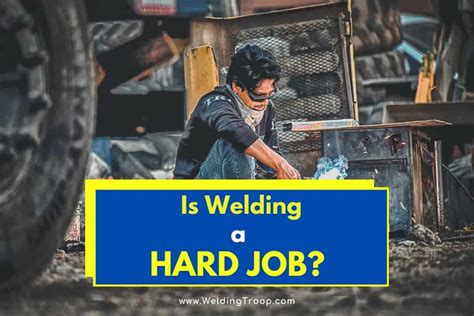Welding is a physically demanding and challenging profession that requires skill, precision, and a strong work ethic. It involves using specialized equipment to join metal pieces together by melting and fusing them. Welders work in various industries, including construction, manufacturing, shipbuilding, and automotive repair.

Physical Demands of Welding
Welding is considered a hard job due to its physically demanding nature. Welders often work in uncomfortable positions for extended periods, such as bending, crouching, or kneeling. They also have to lift heavy objects and manipulate welding equipment, which can strain their muscles and joints. Additionally, exposure to welding fumes and gases can cause respiratory problems and other health issues.
According to the Bureau of Labor Statistics (BLS), overexertion is a leading cause of injury in the welding industry. Welders are also at risk of burns, eye injuries, electric shock, and other hazards.
Cognitive Demands
In addition to its physical demands, welding also requires a high level of cognitive function. Welders must have good hand-eye coordination, spatial awareness, and problem-solving skills. They need to be able to read and interpret blueprints, follow welding procedures, and troubleshoot problems.
Education and Training
Becoming a welder requires a combination of education and training. Most welders start by completing a vocational program or apprenticeship. These programs typically cover basic welding techniques, safety procedures, and industry standards. Some welders also pursue advanced training to specialize in specific welding processes or industries.
Career Outlook
The demand for welders is expected to grow in the coming years. The BLS projects that employment in the welding industry will increase by 3% from 2020 to 2030. This growth is expected to be driven by increased construction activity and the need for skilled welders to repair and maintain infrastructure.
Common Challenges Faced by Welders
Welders face several challenges throughout their careers. Some of the most common challenges include:
- Physical discomfort: Welders often work in uncomfortable positions, which can lead to muscle strain and joint pain.
- Exposure to hazardous materials: Welders are exposed to welding fumes, gases, and other hazardous materials that can cause respiratory problems, eye irritation, and other health issues.
- Competition: Welders often work in a competitive environment, where they compete for jobs and promotions.
- Stress: Welders can experience stress due to the demanding nature of their work and the need to meet deadlines.
How to Become a Successful Welder
Despite the challenges, welding can be a rewarding and fulfilling career. Welders who are successful in their field typically have the following qualities:
- Strong work ethic: Welders need to be willing to work hard and put in long hours.
- Attention to detail: Welders need to be able to pay close attention to detail and ensure that their work meets the required standards.
- Problem-solving skills: Welders need to be able to identify and solve problems quickly and efficiently.
- Teamwork skills: Welders often work as part of a team, so they need to be able to communicate and collaborate effectively with others.
Conclusion
Welding is a hard job, but it can also be a rewarding and fulfilling career. Welders who are successful in their field typically have a strong work ethic, attention to detail, problem-solving skills, and teamwork skills.
Is Welding a Good Career?
Whether welding is a good career depends on your individual interests and skills. If you are interested in working with your hands, enjoy problem-solving, and are willing to work hard, then welding could be a good career for you.
Frequently Asked Questions
What are the most difficult aspects of welding?
The most difficult aspects of welding include working in uncomfortable positions, exposure to hazardous materials, and the need to meet deadlines.
What are the most common welding techniques?
The most common welding techniques include stick welding, MIG welding, and TIG welding.
What safety precautions should welders take?
Welders should take the following safety precautions:
- Wear proper protective clothing and equipment, such as welding helmets, gloves, and respirators.
- Ensure that the welding area is well-ventilated.
- Store welding materials safely and properly.
- Follow all safety procedures and guidelines.
